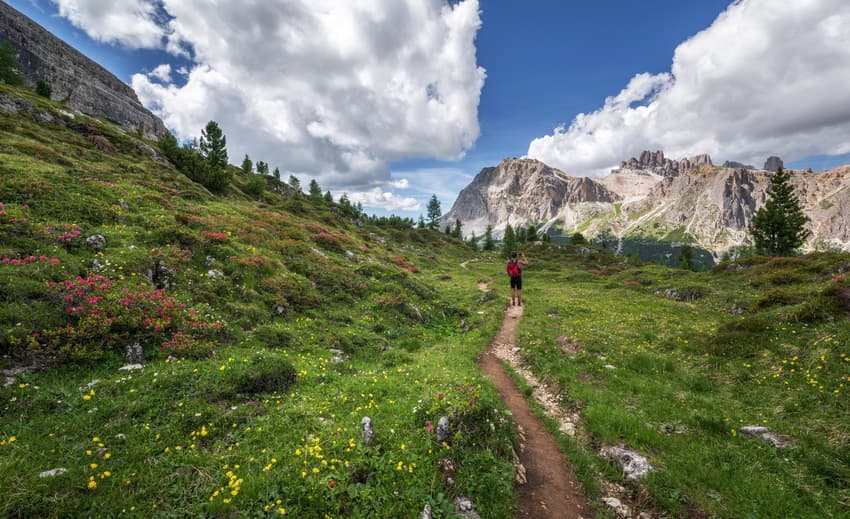La Bella Vita: Italy's best cheeses and spring walking holiday destinations

From sampling the best Italian cheeses to seeing the Italian countryside on foot, new weekly newsletter La Bella Vita offers you an essential starting point for eating, talking, drinking and living like an Italian.
La Bella Vita is our regular look at the real culture of Italy – from language to cuisine, manners to art. This new newsletter will be published weekly and you can receive it directly to your inbox, by going to newsletter preferences in 'My Account' or follow the instructions in the newsletter box below.
As we most recently saw with the furore over a recipe for tomato carbonara with parmesan and bacon published in the New York Times, Italians are well known for angry reactions to unorthodox adaptations of classic recipes. But why is Italy in particular so defensive of its cuisine? Our writer Silvia Marchetti looked at what’s behind this apparent sensitivity and explained why, in her opinion, it’s completely justified.
What do you think? We’d love to hear your thoughts in the comments section below the article.
OPINION: Why do Italians get so angry if you mess with classic recipes?
And for once Italians were quite pleased this week with a food ranking which rated Italy’s cheeses as the best in the world. In fact Italy took most of the top 20 spots on the ‘100 Best Rated Cheeses in the World’ compiled by the TasteAtlas food website - a result which unsurprisingly grated on the French.
Did your favourite Italian cheese get the recognition it deserves in this ranking? If not let us know in our poll (within the article below) which variety you'd put in the top spot.
Are these Italian cheeses really the best in the world?
 Italy's Parmigiano Reggiano has been named the world's best cheese in an online ranking - much to the indignation of French food lovers. (Photo by JUSTIN SULLIVAN / Getty Images via AFP)
Italy's Parmigiano Reggiano has been named the world's best cheese in an online ranking - much to the indignation of French food lovers. (Photo by JUSTIN SULLIVAN / Getty Images via AFP)
This week we also looked at how Swiss Italian differs from the Italian spoken in Italy - which itself of course varies enormously around the country.
While the key distinctions between Swiss Italian and standard Italian can be found in their shared – and not so shared – vocabulary and idioms, differences can also be found in their grammar and manner of speaking. This is largely due to the fact that Swiss Italian, unlike standard Italian, borrows words from its neighbouring German and French-speaking cantons.
Here's a closer look at the main differences you'll want to know about if you spend time in the two countries:
Swiss Italian vs standard Italian: What are the key differences?
It's not quite spring yet, but the weather has been sunny (if still pretty cold) this week in many parts of Italy and our thoughts are turning to travel plans for the warmer months.
Early spring in Italy is the perfect time for hiking, biking and generally exploring the countryside and we have a roundup here of six of our favourite destinations for a walking holiday.
Six Italian walking holiday destinations that are perfect for spring
And if you've ever deliberated over whether to take a trip to Italy alone, we say you should go for it - here are our tips on enjoying the country's museums, galleries, aperitivo hours and dining either solo or with new travel companions.
Five tips for enjoying Italy as a solo traveller
Remember if you'd like to have this weekly newsletter sent straight to your inbox you can sign up for it via Newsletter preferences in "My Account".
Is there an aspect of the Italian way of life you'd like to see us write more about on The Local? Please email me at [email protected].
Comments
See Also
La Bella Vita is our regular look at the real culture of Italy – from language to cuisine, manners to art. This new newsletter will be published weekly and you can receive it directly to your inbox, by going to newsletter preferences in 'My Account' or follow the instructions in the newsletter box below.
As we most recently saw with the furore over a recipe for tomato carbonara with parmesan and bacon published in the New York Times, Italians are well known for angry reactions to unorthodox adaptations of classic recipes. But why is Italy in particular so defensive of its cuisine? Our writer Silvia Marchetti looked at what’s behind this apparent sensitivity and explained why, in her opinion, it’s completely justified.
What do you think? We’d love to hear your thoughts in the comments section below the article.
OPINION: Why do Italians get so angry if you mess with classic recipes?
And for once Italians were quite pleased this week with a food ranking which rated Italy’s cheeses as the best in the world. In fact Italy took most of the top 20 spots on the ‘100 Best Rated Cheeses in the World’ compiled by the TasteAtlas food website - a result which unsurprisingly grated on the French.
Did your favourite Italian cheese get the recognition it deserves in this ranking? If not let us know in our poll (within the article below) which variety you'd put in the top spot.
Are these Italian cheeses really the best in the world?

This week we also looked at how Swiss Italian differs from the Italian spoken in Italy - which itself of course varies enormously around the country.
While the key distinctions between Swiss Italian and standard Italian can be found in their shared – and not so shared – vocabulary and idioms, differences can also be found in their grammar and manner of speaking. This is largely due to the fact that Swiss Italian, unlike standard Italian, borrows words from its neighbouring German and French-speaking cantons.
Here's a closer look at the main differences you'll want to know about if you spend time in the two countries:
Swiss Italian vs standard Italian: What are the key differences?
It's not quite spring yet, but the weather has been sunny (if still pretty cold) this week in many parts of Italy and our thoughts are turning to travel plans for the warmer months.
Early spring in Italy is the perfect time for hiking, biking and generally exploring the countryside and we have a roundup here of six of our favourite destinations for a walking holiday.
Six Italian walking holiday destinations that are perfect for spring
And if you've ever deliberated over whether to take a trip to Italy alone, we say you should go for it - here are our tips on enjoying the country's museums, galleries, aperitivo hours and dining either solo or with new travel companions.
Five tips for enjoying Italy as a solo traveller
Remember if you'd like to have this weekly newsletter sent straight to your inbox you can sign up for it via Newsletter preferences in "My Account".
Is there an aspect of the Italian way of life you'd like to see us write more about on The Local? Please email me at [email protected].
Join the conversation in our comments section below. Share your own views and experience and if you have a question or suggestion for our journalists then email us at [email protected].
Please keep comments civil, constructive and on topic – and make sure to read our terms of use before getting involved.
Please log in here to leave a comment.